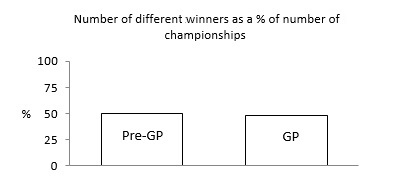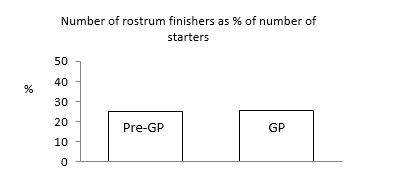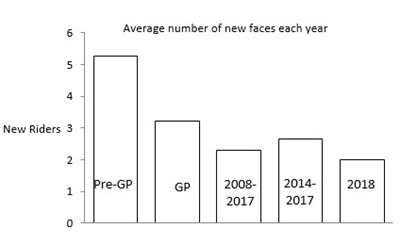
| |||||||
| |||||||
|
|
Lies, damn lies... ...and statistics. Benjamin Disraeli is credited with this description and I wonder what he would have made of speedway. After all, speedway would be lost without its statistics.  Some say the GP Series is fairest way to determine the World Champion. They argue the outcome does not hinge on an engine failure (think Dave Jessup in 1978) or home track advantage (think Jerzy Szczakiel in 1973). Others say that coming out on top has more to do with staying out of trouble, and point to Tomasz Gollob in 1999 and Jason Doyle in 2016, both of whom may have missed the top spot through injury. 2017 marked the 69th post-war world speedway championship, with the number of titles decided by the GP Series exactly half that of one-off world finals, so what do the statistics tell us? The first statistic is surprising. 11 different riders became World Champion in the GPs compared to 23 in the one-off finals. The ratio of these (1:2.1) closely matches the ratio of number of titles awarded in each format (1:2). The second statistic is just as surprising. The ratio of the number of champions to titles is 1:2.1 (also) in the GPs and 1:2 for the one-off finals (see the diagram below). This means that on average, a champion has two titles and multiple champions have 3, irrespective of how they were won. The reason is that a few riders have always dominated the world championships. In the GPs, it has been riders like Rickardsson, Crump, Hancock, etc, while Mauger, Fundin, Olsen, etc. reigned supreme in the old days.  Hans Nielsen is a three-time winner of the one-off final and the first winner in the GP format. Meanwhile, Tony Rickardsson is the last one-off final winner and he went on to become a GP champion five times. Given this and the fact that professionals such as Mauger and Olsen (the prime mover in promoting the GP Series) would have had no difficulty adapting to the GPs, it probably means the GP Series is just a different way to reach the same conclusion - at least as far as the champion goes. The rostrum finishers throw up another surprising statistic. The fraction of different riders who have stepped on the podium is almost exactly a quarter the total number of finalists, irrespective of the format (see below).  I did warn about misleading statistics at the start, however. 253 different riders lined up in the old-style finals. Despite the GP Series being bolstered by a larger field between 1998 and 2004, there have been only 87 GP riders (excluding wild cards and reserves). This means there were proportionally 50% more different riders competing in the old days and the above figure shows those finalists were not there to make up the numbers. So do the GPs include the best possible line-ups? I would say no, because selection takes place a year in advance and it excludes the in-form riders. While the true champions are always in form, the narrowed field makes the GPs less competitive overall, especially in terms of rostrum places. I do not like the GPs for two reasons. Firstly, I am tired of seeing the same old faces. We saw 237 new faces in the 45 Pre-GP world championships after 1949, or just over 5 a year on average (see the diagram below). Since the initial GP in 1995, we have seen only 71 new faces in 22 years (or just over 3 a year on average). This excludes the reserves and wild cards, who let's face it are there to make the numbers up (even if they occasionally upset the applecart). In the last 10 years, the number of new faces has dropped to just over 2 per year on average and in 2018 it is 2. Given that the three qualifiers from the GP Challenge in 2018 are all old hands, things do not look like improving soon.  However, the main reason I do not like the GPs is because they lack the tension and drama of a one-off world final. The champion is nearly always known before the last round, which means the series does not reach a climax. In the old style world finals, there was the belief that almost anyone could win on the night, even if they seldom did. While I dislike the GP Series, I admit it has had its highlights and it has provided plenty of memorable moments. The problem now is I find it stale and no longer a flagship for speedway. That is only my opinion, of course. There are two quotes that come to mind: 'If it ain't broke don't fix it," and "Insanity is doing the same thing over and over and expecting a different result." I'll let you decide which is more apt for speedway and the GPs!
This article was first published on 11th September 2018
"Very interesting article, and one of the few with a new angle, and backed up by data and not just opinion ("Bring it back to Wembley" etc.). This discussion may well go on for a long time. For example, of all the qualifiers that went towards getting to a World Final, how many of these were exciting, how many of the races really counted etc. I'm sure that TV money has something to do with having a GP series as well. Amongst the major motor sports, Speedway was unusual in that it kept the one-off World Championship for a very long time, so perhaps it was just time to fall in line with the rest of the world. Actually regardless of the standings, i.e. the winner is known before the last GP, I think all of them are eagerly anticipated." "Great fun mate. This is for those who say ... If Dave Jessup had won his four remaining heats after his ef in 1978, I would say he should have won the Gold Medal. But he did not, beaten by Gordon Kennett in round 5. Then he lost the Bronze Medal run-off. That, for me says his first round ef did not cost him the World Title. And Chorzow was not Jerzy Szczakiel's home track. Cheers !" "With out a doubt, one off final. Went to a few at Wembley. Not knowing who would win or be placed to the end. As the article say's sometimes you know who is World Champ with a couple of GP to go. " "I dunno, I guess I am a bit old fashioned in a way because I also prefer the old way where while the title was likely to be fought out by only a few. There could at least be a surprise winner on the night like a Jerzy Szczakiel, Egon Muller or even a Gary Havelock. And if you go back even further there were other surprise winners including the likes of Australia's Jack Young who won the 1951 World Final while still a Division 2 rider (though as we know, unlike the 3 mentioned, Young would win again in 1952 and spent the rest of the 50s riding in just about every World Final. He wasn't just a one hit wonder and is still revered to this day 31 years after his death as one of the best ever riders). Should they go back to the old format? Maybe, but the SGP is a money spinner and I can't see them turning their back on that."
|
||||||
| Please leave your comments on this article (email address will not be published) | |||||||

